Indoor Vertical Farming
AI-controlled production of soft fruits using new sensor systems
Obst- und Gemüse-Absatzgenossenschaft Nordbaden eG and Obstgroßmarkt Mittelbaden eG have commissioned Fraunhofer UMSICHT with the further development of a new cultivation method. The "inBerry" project, which has now been launched, focuses on a data-driven and year-round production method for indoor cultivation that is made even more efficient by the integration of innovative sensors. In collaboration with the technology provider vGreens Holding GmbH, a new production method for the sustainable vertical cultivation of special crops such as strawberries, raspberries and blueberries can be created.


Alongside apples, strawberries are one of the most popular types of fruit in Germany. However, the strawberry harvest in Germany in 2024 is expected to be even smaller than in the already very poor harvest year of 2023. According to an initial estimate by the Federal Statistical Office (Destatis), farms expect a harvest of around 70,000 tons of strawberries in the open field. This would be the lowest harvest volume since 1995, 24% below the strawberry harvest in 2023[1] . The reasons for this negative trend are the continued decline in the area under strawberry cultivation and crop failures due to weather events. The consequences of severe weather events are particularly noticeable in the fruit and berry business.
Reduction of environmental impact
Ensuring the supply of fresh, high-quality food while at the same time reducing the environmental impact also places a further burden on agricultural producers. Studies show that the focus in future should not be on further maximizing yields, but rather on reducing the environmental impact while maintaining the same yield. Uwe Schwittek from OGA Nordbaden eG, whose core business is the marketing of fruit and vegetables, agrees: "Our task is to continue to meet market demand in the future and provide an appropriate range of goods. Against the backdrop of socio-political requirements and the need for climate-neutral production, we are therefore looking into new, forward-looking production processes." One of these methods is indoor vertical farming – a form of controlled environment agriculture that offers a resource-efficient, space-saving and regional cultivation method directly where it is needed.
Increase the efficiency of indoor cultivation
Until now, indoor vertical farming has mainly been used to grow salads and herbs. The production spectrum is now to be expanded as part of "inBerry". "In cooperation with vGreens Holding GmbH, which specializes in the data-based and AI-controlled production of strawberries, we are working on a production method for berries that is raised to a higher level by using optical sensor technologies for quality determination," explains Volkmar Keuter from Fraunhofer UMSICHT. "In the Indoor Farming working group, we are developing data-supported technologies to increase the efficiency of indoor cultivation," adds his colleague Dr. Felix Thoma. The project is set to run for several years and, in addition to data-driven strawberry cultivation, includes the development of new indoor cultivation systems for other fruits.
Last modified:
 Fraunhofer Institute for Environmental, Safety and Energy Technology UMSICHT
Fraunhofer Institute for Environmental, Safety and Energy Technology UMSICHT